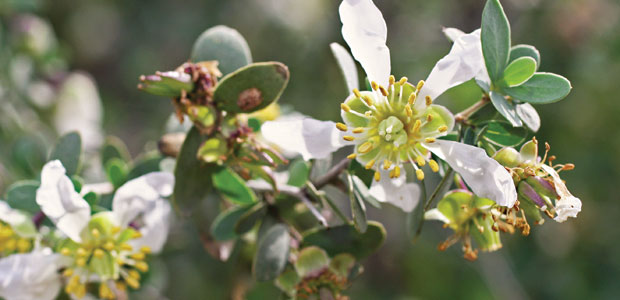Advertisement
Jojoba
Coming to a cosmetic near you

The cosmetic properties of jojoba (pronounced ho-ho-ba) are amazing. Jojoba can bring body and shine to dull, lifeless hair. It’s also great for skin care, offering simple, speedy, and surprising results.
That’s because the extract of beans from the desert shrub, Simmondsia chinensis, commonly called jojoba, is similar in chemical structure to sebum, the liquid wax ester produced by human skin. Sebum has two functions: preventing bacteria from invading the skin and keeping the surface moist.
The waxy golden extract is also high in vitamins E and B-complex, and minerals including silica, zinc, and copper, and it has a very high iodine content.
When our bodies fail to provide the new cells required to replenish those we lose each day, jojoba can help ward off signs of aging that appear in the form of wrinkles and hair loss. Jojoba is a beauty panacea that can bring health and vitality to skin and hair.
Jojoba Hair How-To
More is not better when it comes to conditioning the hair with this herb. To apply the conditioner, put only three or four drops of jojoba oil onto the palms of the hands, rub the hands and fingers together, and then run your fingers through your hair, massaging the scalp. Leave the conditioner on for an hour or so before shampooing with a natural shampoo.
Not only will the oil of this beauty bean condition the hair follicles, but as an added bonus, it will condition the scalp, alleviating conditions such as dandruff and dry, scaly, or irritated skin. A healthy scalp allows the hair follicles to produce new, strong hair growth, making this a win-win treatment that results in shiny, healthy locks.
A Little Goes a Long Way
For skin care, buy the best-quality jojoba oil because a small bottle goes a long way. Apply at night to allow the vitamins and minerals to penetrate the skin cells. Thoroughly cleanse the skin. Add jojoba to your favourite natural moisturizing creme or lotion, or alternatively, pour three or four drops onto a cotton pad, and with gentle upward strokes massage the oil over the neck and face. Use a clean pad to remove any excess on the surface of the skin.
Due to the molecular structure of jojoba oil, it is readily absorbed and it will not leave a greasy or sticky film. Jojoba has almost no indication of allergic reactions and has shown good results in the treatment of acne. Jojoba has a long shelf life; it is an exceptionally stable substance. It makes an excellent carrier oil for aromatherapy. As a base for massage oil, jojoba is unsurpassed.
Potential Biofuel
Jojoba has many claims to fame, not the least of which is that it replaced sperm whale oil in cosmetics when the US government banned whale hunting. Most research on this herb was conducted in the 1970s, when cosmetic companies searched for a replacement for sperm whale oil.
More recently jojoba has been studied for its use as a replacement for diesel fuel. Dr. Selim, an associate professor at the University of the United Arab Emirates, discovered that when jojoba fuel reacts with oxygen, heat energy is generated. Lower levels of carbon dioxide were released, and as jojoba does not contain sulphur, no sulphur dioxide was formed.
The demand for jojoba has prompted farmers in countries such as India, Egypt, Mexico, and Israel to plant crops of jojoba. The shrub needs specific growing conditions and does not produce a harvest for five years, but the rewards are long term, as the plants can live for more than 100 years.




